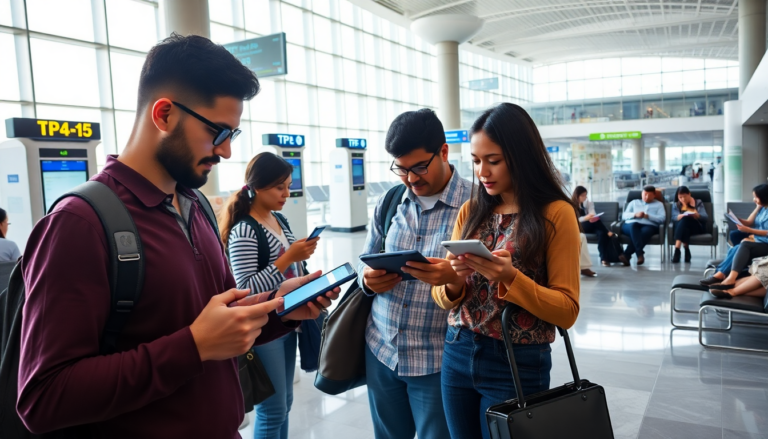Argomenti trattati
The travel industry is experiencing a remarkable transformation, all thanks to the relentless march of technology. Traditionally, airlines and airports held the reins, controlling everything from check-in to baggage tracking. But that’s changing fast. Major tech companies, especially giants like Apple, are setting new standards and expectations for travelers. So, what does this shift mean for the future of air travel? Let’s dive in!
The Shift in Control of Passenger Experience
As traveler expectations evolve, airlines are finding themselves adapting to the design and interface norms that tech companies have established. This shift is a game changer. No longer can airlines solely dictate what a satisfactory customer experience looks like; instead, they need to align their services with the frameworks provided by platforms like Apple Wallet and AI assistants. A perfect illustration of this trend is Apple’s recent announcement that U.S. iPhone users can now store their passports digitally in Apple Wallet.
This innovation not only modernizes travel but also simplifies the airport security process. With a TSA-approved digital ID, travelers can present their passports as easily as they would a boarding pass, creating a smoother experience at security checkpoints. It’s a significant leap forward in the realm of digital identities in travel, an area that has faced challenges due to regulatory complexities and safety concerns.
As the travel industry embraces this digital transformation, integrating government-recognized IDs into consumer tech platforms signals a major shift in how we travel. Imagine a future where biometric-driven processes replace physical documentation, potentially streamlining the entire travel experience. Exciting, isn’t it?
Innovations Enhancing Passenger Experience
Alongside the digital passport initiative, Apple has also revamped the boarding pass experience within its Apple Wallet. The upgraded boarding pass transforms the standard experience into a comprehensive travel hub, providing real-time flight updates, terminal maps, and baggage tracking—all from the iPhone lock screen. Air Canada is leading the charge here, being one of the first airlines to adopt this innovative approach, showcasing a strong commitment to enhancing passenger-centric digital solutions.
This redesign not only alleviates passenger stress by offering essential journey tools but also raises the bar for what travelers expect from digital interfaces. With all travel-related information accessible at a glance, passengers can navigate their journeys more efficiently, reducing their reliance on multiple apps and platforms. Ever thought about how much time we waste switching between different apps?
This trend is part of a broader movement where tech companies are becoming central to modern travel infrastructure. By embedding services like baggage tracking and digital passports into their platforms, these companies are reshaping how travelers interact with the travel ecosystem, often outperforming traditional airline apps in usability and functionality.
The Role of AI in Travel Evolution
And let’s not forget about the influence of artificial intelligence. Iberia has recently made headlines by becoming the first airline to launch an AI assistant powered by OpenAI’s ChatGPT platform. This AI-driven assistant is designed to help travelers explore destinations, search for flights, and plan trips seamlessly—integrating directly into a widely recognized consumer platform rather than relying on standalone applications.
While this initiative marks a significant leap forward, it also brings strategic challenges. Limited access to the GPT Store might hinder its visibility among average travelers. How will Iberia promote this new channel without diverting traffic from its existing platforms? Regardless, this launch highlights the growing potential for AI to fundamentally reshape how travelers discover and engage with travel services.
As tech companies continue to innovate, the travel industry must adapt quickly. The integration of AI assistants and digital tools signals a future where technology becomes the primary interface for travelers, potentially replacing traditional trip planning and booking methods. Are you ready for this shift?
Conclusion: Preparing for the Future
In conclusion, the travel industry stands on the cusp of a technological revolution, driven by the influence of major tech players. As companies like Apple and AI platforms redefine the travel experience, airlines must embrace these changes to stay competitive. The future of travel isn’t just about innovation; it’s about collaboration between traditional travel providers and tech leaders to create a seamless, efficient, and user-friendly experience for passengers. So, as we look ahead, the pressing question for airlines is no longer whether to integrate technology, but how quickly they can adapt to this new landscape. What are your thoughts on this exciting evolution?

